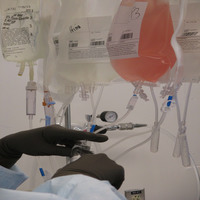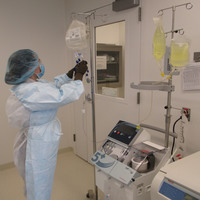Advances in personalized cellular medicine are becoming a reality...
The FDA approved the first cell-based therapy for prostate cancer in April 2010, opening the door for the marketing and delivery of novel bio-therapeutics to treat cancer and other disease indications, such as HIV, and autoimmune disorders, such as graft versus host disease and diabetes. These are bio-therapeutics that harness and engineer the patient's own cells as part of the medical treatment to provide a targeted personalized therapy with minimal autoimmune-mediated toxicity because the patient is not receiving anything considered foreign.
Here at Penn, the Clinical Cell and Vaccine Production Facility (CVPF), a GMP facility accredited by the Foundation for the Accreditation of Cellular Therapy (FACT) and a Department of Pathology/Lab Medicine and NCI approved Abramson Cancer Center Shared Resource, manufactures such bio-therapeutics for safety and initial efficacy testing in first-in human, pilot, and Phase I/II clinical trials. Enabling this bench-to-bed translation is the mission of the CVPF.
The CVPF provides focused scientific, technical and regulatory support for investigator initiated investigational new drug applications (INDs) in cell and gene therapy. Under compliance of FDA 21 CFR Parts 210 and 211, the CVPF performs cell processing on a range of different cell types, to include bone marrow derived CD4+ and CD8+ T lymphocytes, dendritic cells, and marrow stromal cells (aka mesenchymal stem cells). In each of these cases, cells are expanded ex vivo with or without genetic modification to the cells before being introduced back into the patient, either alone or in combination with other therapies such as vaccines.
In scenarios in which it is not possible to use a patient's own cells, cells from a matched donor are used to manufacture the cell therapy product. Current open trials are in the area of hematologic malignancies (myeloma, leukemia, and lymphoma), breast cancer, neuroblastoma, ovarian cancer, lung cancer, HIV, and osteogenesis imperfecta. In addition, although the CVPF is not currently supporting trials of such therapies, the Facility is able to process non-marrow derived cells such as neural stem cells, islet cells, and myoblasts.
CVPF Mission
The overall mission of the Clinical Cell and Vaccine Production Facility is to help translate insights into novel cellular therapies. Other important missions include:
- To activate and/or gene transduce cells for allogeneic or autologous cell0-based cancer therapies.
- To answer questions relative to the effectiveness of cell and gene therapy by analysis of patient samples.
- To develop new and improved methods of ex vivo cell culture and gene transduction.
- To maintain a knowledge of regulatory requirements and guidelines and provide expertise to Penn investigators and collaborators.
- To increase the impact of potential novel cellular therapies by facilitating wide application of the techniques developed.
The CVPF has two GMP suites: one on the 6th floor of the Maloney Building in the Hospital of the University of Pennsylvania (HUP) and a second in the Ravdin Building, also within HUP. For a peek inside, please visit our virtual tour (go to the “Videos” tab and check out the “Tour of Maloney GMP Facility” video).
How you can help:
To direct a donation to the CVPF, contact Tricia Bruning, Gifts Officer, Abramson Cancer Center (215) 898-0578, tbruning@ben.dev.upenn.edu.



